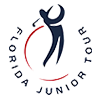SEMINOLE, Fla. – Many things differentiate Ryanne Jackson from the average golfer. Diagnosed with scapuloperoneal muscular dystrophy her first year of college, Jackson struggles to lift her arms above her head and has no dorsiflexion in her ankles.
Yet, amidst these physical hurdles, there is a remarkable achievement on her resume that shines brightly: USGA champion. Jackson reigned victorious at the 2023 U.S. Adaptive Open at Pinehurst No. 6. The championship was held in July and included 54 holes of stroke play against a 96-player field. Jackson posted rounds of 76-75-74 to take the victory by five strokes over the field, after finishing runner-up at the Inaugural U.S. Adaptive Open in 2022.
It is safe to say that Jackson is tough contender and a player to watch leading up to the Inaugural Florida Adaptive Open in October.

Jackson explained that she was more interested in basketball to begin with and her dad was always her coach. However, she said that early on she felt as though running was harder for her than it was for everyone else. She ran flat-footed and had the tendency to fall down easily when bumped more frequently than the other girls. It was hard for Jackson to keep her balance and she said that even though she was giving it her all, it looked as though she was barely trying.
“I feel like a lot of times people see coach’s kids as kind of lucky that their parents are coaching them, but they don’t realize that the expectations are so much greater,” Jackson said. “But not knowing that I had muscular dystrophy yet, my dad was one who really defended me in a lot of situations where sometimes it didn’t seem like I was trying. He knew I was giving it 100 percent, we just did not know why it did not look like I was giving it 100 percent."
Leading up to her diagnosis, she saw many doctors that were confused over her various test results. When she was finally diagnosed with muscular dystrophy, it gave her a sense of relief, but it also gave her an excuse to give up.
“I think in a sense, I gave up a lot. I would say the progression of my muscular dystrophy within that first year was significant because I realized why I could not do what other people were doing,” Jackson said. “I definitely used it as an excuse to not participate.”
Jackson was diagnosed with scapuloperoneal muscular dystrophy, which affects her scapula muscles and her lower legs. Muscular dystrophy is the weakening or fatiguing of muscles over time. There are various types of muscular dystrophy that affect people in many different ways.
For Jackson, she struggles to lift her arms over her head and has no dorsiflexion in her ankles. Dorsiflexion is the backward bending or contracting of the foot. In other words, it is the action of raising the foot upward towards the shin. This causes Jackson to walk in a labored way and she becomes fatigued quickly.
 She gives credit her college coaches for helping her through that difficult period, but describes the U.S. Adaptive Open as being monumental in giving her a sense of belonging in the sport again. Jackson initially harbored concerns that her lack of a visible disability may make her feel out of place, but her experience playing in the event as encouraging and inspirational.
She gives credit her college coaches for helping her through that difficult period, but describes the U.S. Adaptive Open as being monumental in giving her a sense of belonging in the sport again. Jackson initially harbored concerns that her lack of a visible disability may make her feel out of place, but her experience playing in the event as encouraging and inspirational.
“Everyone was so nice and super encouraging and it almost allowed me to accept my diagnosis in a way that I hadn’t before. Just seeing people who have it significantly worse than I did or have always lived with their disability. Seeing all the different stories has really helped me personally.”
The U.S. Adaptive Open not only helped Jackson gain a different perspective on her disability, but it is also where she heard about the Inaugural Florida Adaptive Open. Jackson grew up playing on the Florida Junior Tour and in FSGA championships.
“I am so excited that Florida has gotten involved in something so special. Being able to play an adaptive event in Florida and represent where I’m from, especially being so close to home for me and also being able to represent the disabled community here is really important for me.”
The Inaugural Florida Adaptive Open will consist of 36-holes of individual stroke play against a 60-player field. Male and female, professional and amateur golfers that fall into one of eight impairment categories are eligible to compete. The event will be played on the South Course at Innisbrook Resort and Club on October 1 – 3.
Jackson’s journey in golf has certainly been special. Filled with discouragement but also victories and accolades she never thought she would achieve in her lifetime. The Saint Petersburg native has become a certified EMT and recently started a new job as a patient care tech at St. Anthony’s Hospital. She is excited for the opportunity to start a career in the medical field.
However, she still plans to make time to play golf. There was a time when Jackson wanted to quit playing and never look back. Her dad always told her that she was too good to quit, but she was adamant about her decision. Except, she prevailed. Even though it was hard, even though she has physical limitations, and even though many people would have understood her decision to quit. Yet, she persisted.
“Now, looking back, [my dad] says, you must have liked it a little bit because no one can really get to the point that you have reached without enjoying it a little,” Jackson said.
“Sometimes I think I try to tell people that I don’t like it, but I might like it a little bit more than I’d like to realize.”
The world of adaptive golf is filled with countless stories of perseverance and inspiration. The Florida State Golf Association is proud to enter this world and begin to fill our record books with these tales of triumph, dedication and tenacity.
Learn More About the Inaugural Florida Adaptive Open






